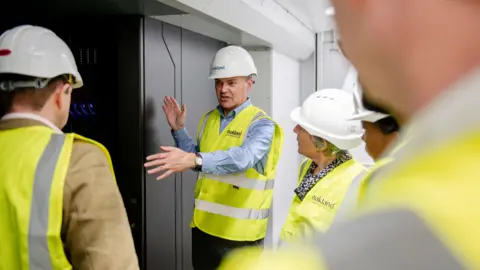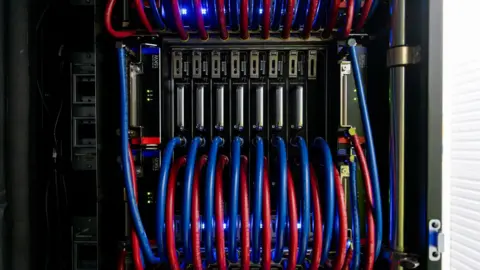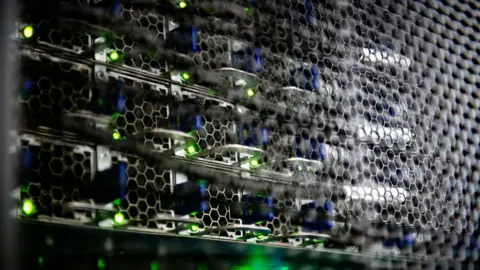'World-leading supercomputer using AI to develop vaccines'
 University of Bristol
University of BristolA £225m supercomputer is using artificial intelligence (AI) to develop new drugs and vaccines.
When it is fully operational this summer, the Isambard-AI computer in Bristol will be the most powerful supercomputer in the UK.
Last week, Prime Minister Sir Keir Starmer unveiled plans to "unleash AI" across the UK in an effort to boost growth.
Simon McIntosh-Smith, a professor in high-performance computing at Bristol University, said the Isambard-AI meant the UK "genuinely can be competitive with the world".
Speaking to BBC Radio Bristol, Prof McIntosh-Smith said: "We've actually got a little bit of the system already up and running, we already have people using it to do things like look for new drugs and new vaccines to treat people."
He added that the team are using the computer to develop vaccines for Alzheimer's and other forms of dementia, as well as treatments for heart disease, emphysema and different types of cancers.
The technology is even being used by one group of researchers to greatly improve the detection of a type of skin cancer called melanoma in a huge range of skin tones.
"It can do a lot of the grunt work, a lot of the things that would just be beyond humans because they have so much thinking power and so much computing power," he added.
 University of Bristol
University of BristolBut how exactly can artificial intelligence be used to create new vaccines and drugs?
As Prof McKintosh-Smith explained, AI models are now capable of "simulating the way that drugs actually work inside the body, at the molecular level right down to atoms and molecules".
"Many drugs work by targeting certain proteins in the human body and deactivating them or changing the way they behave," he explained.
In the past, scientists would have had to work out themselves how potential treatments could interact with these proteins - a process based on "lots of experience and intelligence", but also "educated guessing".
"You can only make so many [guesses] Prof McKintosh-Smith added, "and physically making things takes time and costs money and all sorts of things like that, so how that sort of physical experimentation is quite limited."
But all this, he explained, is changed by a supercomputer like Isambard AI - using technology with the capacity to use databases of millions of potential drugs that can be tested in their earliest stages virtually rather than in a lab.
"Where artificial intelligence comes into it, is rather than trying all possible combinations of things it actually tries a whole bunch of random possibilities, looks at which are most promising, and then hones in on those.
"Artificial intelligence helps to zoom in and cut down on hot spots quickly, and there's lots of variance in how people are using that," he added.
Prof McKintosh-Smith added: "We could be saving millions of lives with some of the things that we're talking about here and I find that tremendously exciting - it's brilliant to be able to actually be doing it right here in Bristol."
'Potentially world-changing'
In his speech earlier this week, the prime minister said AI had "vast potential" for rejuvenating public services in the UK. He gave examples including using the technology to inspect roads and spot potholes, or diagnose diseases like cancer more quickly.
When questioned about the huge investment being made in Isambard-AI, Prof McIntosh-Smith said the "payback is potentially world-changing".
Comparing the development of AI to the launch of the internet or invention of mobile phones, Prof McIntosh-Smith said: "One of the advantages of something like Isambard-AI being funded by the government is all of that work is then done in the public [interest], it's done by academics and that work is much more open than it might be had it been done in a company."
 University of Bristol
University of BristolWhen it is fully operational the Isambard-AI, based at the National Composites Centre in Emersons Green, will be among the "top 10 fastest" supercomputers in the world.
"We've done things that no-one else has done before," said Prof McIntosh-Smith.
Supercomputers need vast amounts of energy to function, and the rapid increase of AI in general has caused serious concerns about energy consumption.
Despite being designed to be as efficient as possible, Isambard-AI is no exception.
But Prof McIntosh-Smith told the BBC it could come with an unexpected benefit, as the waste energy it produces comes out as hot water.
"We're actually exploring ways of using that to heat the local homes and businesses," Prof McIntosh-Smith said.
"So if you happen to be living near Isambard in the future we might be able to heat your home with our waste energy."
Follow BBC Bristol on Facebook, X and Instagram. Send your story ideas to us on email or via WhatsApp on 0800 313 4630.
